You see an older person, and perhaps only notice faltering footsteps, a distant gaze and rumpled skin.
Whether family or stranger, do we take the time to sit and ask what events, what pain and joy have marked their life?
I sat down with the delightful Ann Rowsell just before her 100th birthday this month and asked about her life.
“I was born in Taree in August 1915. Mum was Susan Martin and Dad was Fred Richardson and they married in their thirties and lived on a farm at Kimbriki. There were four of us kids, George was three years older than me, Nerida who was 20 months older than me, so thought she could boss me around, and Ross after me.
I always loved the farm life. Dad had a Bedford, and it was a big event to drive into town or visit people. But when I was about five, Dad rented a house in town, (Taree) so we could go to school. When I was about 12 we moved back to the farm and went back to the Kimbriki School two miles away. We didn’t ride horses or go by sulky, we walked! Two miles there and two miles back every day.
We all had chores every day. I helped with the housework and Nerida did the cooking with Mum. I had to sweep the paths, get the sticks for the next morning’s fire, and clean the lino. Later we got carpet squares and a hall runner, but every Friday I had to lift them and wipe underneath and clean the windows and help scrub the big verandah that went all around the house. I used a pumice stone on my hands and knees. If we didn’t do our jobs we were penalised. We did as we were told, we wouldn’t tell our parents what to do!
I liked school. There were about 15 of us with one teacher, Mr Kenny. He taught all subjects and had different sections on the blackboard for the different ages. His daughter Kathleen used to come and sit with us when he went home at 11am for a cup of tea. And his wife taught us sewing. There were more boys than girls, but we all played chasing, rounders, hide and seek, skipping. And we had a tennis court at the school. We played jacks with the knuckle bones from the stew but marbles was our favourite game. We had hundreds of them. If a good one like a glass cats eye got a little mark on it we used to leave in the pat of butter as we thought that smoothed out the chip! We used to love Empire Day and dancing round the maypole.
I had skinny legs and got the nickname Spindle. Victor Allen used to see me in town and yell out, “How ya goin’ Spin” just to annoy me.
Holidays? We never went anywhere. Too much work to do on the dairy farm and there wasn’t the money. We just roamed the hills, swam in the river and rode our horses about like all everyone else. Dad later got a T model Ford, and he’d spend every Sunday pulling the motor apart and putting it back together again. We loved going out in that, you started it with a cranking a handle at the front. And you could pull up the sides of special material with a small Perspex type window to see out when the weather was windy or wet.
Once a fortnight we’d drive into Taree. Every Tuesday a man would come out to the farm and take mum’s order and then we’d go into Moxie’s store in Wingham and pick up the bags of flour and sugar and so on. Tea came in 25 pound bags from the tea man. It was kept in a special tin and you got a belting if you left the lid off. Same with the flour that was kept in a special airtight tin so the bugs didn’t get in. There was no refrigeration, we put the milk and butter in a tin with a wet bag over it and buried it in the damp gravel under the water tank and kept it wet.
The Carneys were our butcher and they’d come in twice a week from Krambach bringing corned beef and meat in a pan closed in to keep it cool, or we’d go to his van and look at the meat and buy what we wanted. Or you could order it the week before and he’d bring it out to every house. In winter we often killed our own meat and shared it between four farmers. You’d get a forequarter one month and a hind quarter the next, so everyone was even. As time went on we’d have killers and send it to Krambach and they’d cut it up and into different cuts and make mince meat and sausages from scraps. We ate all that first then corned beef was corned down in brine by mum in a big special pot and that’d last maybe three months. She’d soak and boil it up and it tasted beautiful. Better than a lot of meat now.
We had chickens and horses but my favourite was a pony called Lightning. The mother was leaning against a fence in a storm and was hit by lightning and killed the mother so we took the three day foal in and reared it. It lived in the garden when it was little, except one time it rained for a fortnight so he stayed in the outside laundry where we did all the washing by hand. Lightning was part of the family, if you left a door open he’d come inside. And he loved to nibble the washing on the line, especially silk stockings! He was never any good to ride as he was too spoilt.
(continued below slideshow)
For entertainment we had a wireless operated by a car battery later on. Dad played the violin and I studied the piano but I wouldn’t practice so gave it away. We all learned to dance on the front verandah. My cousin Margaret Lambert taught us, and Mum and Dad too.
When George turned 17 and got his licence, Dad bought a car for him to drive but it was for all of us to go to dances. We always took a rug in the car so we could curl up in the back seat and sleep while George took an hour saying goodnight to his girlfriend Hazel (whom he married).
Mum was wonderful. She died aged 65 from a brain hemorrhage. She was a Christian woman who taught us a lot. What was right and wrong, how we should live. We all listened to her. She made all our clothes. I got a dress one week and she made one for Nerida the next. Mum taught sewing at Kramback before she was married.
I had a boyfriend, a friend, Tom, when Nerida starting going with Paddy and they’d come down on weekends. We’d go walking by the river, pick mandarins and oranges and eat them, just stilly things.
I met Sid, my husband, at a dance at Mount George. He asked me to dance the Jolly Miller waltz. I had a red velvet evening frock on with a blue spray on it, which Mum made of course. We never wore our dance dresses more than two or three times. Sid was working in the timber mill, but was on compo when I met him. He’d been with an old bloke from the mill who went around a corner and went over the edge of the mountain. A tree stopped them and the old fellow was unhurt, but Sid was injured but he ran two miles down the mountain to the Mackay’s house to get help. Mrs Mackay said the blood stayed on the carpet in the front hall for years.
Anyway a week after that dance he sent me a letter asking me to go to a ball in Wingham so things started from that. Mum at first went into a deep spin as they were Catholics but after I went with him a few times, we found out that his mother had turned C of E, so everything was okay. Sid used to come out on Sunday to the farm and leave early Monday morning. He only had a push bike so he’d get up at 2am and go to the train station at Charity Creek and light the little lamp on the station and when the train came round the bend he run real quick and jump on the train. After a month the driver used to slow down for him every Monday and let him ride in the guard’s van.
Sid was the eldest of eight and had to help rear the young ones as they came along, his sister was fifteen years younger than him. His birthday was December 23 and his mother told him as they were so poor, he wouldn’t get a birthday present, just one at Christmas same as everyone else. When we married I always made a fuss of his birthday and gave him a nice present ‘cause he’d never had any as child. His mother ran a boarding house in Wingham as his Dad had had a stroke. Sid left school at 12 as they couldn’t afford to keep him at home. He rode his bike to work at the mill and was so punctual everyone set their clocks by him. He took a billycan of cocoa on the handle bars of his bike for morning tea and left it on the boiler at the saw mill which was run by steam, so kept it hot!
Mum died before I was married, but she knew Sid and I were courting and Sid let her know he was in love with me. He asked Dad first and he said to Sid, “I hope she doesn’t burn the water”! As I never cooked, that was Nerida’s job. I only cooked every Monday night, something simple but I made a good bred and butter pudding and that’s still my special dish.
We had a simple wedding, I got married just in a travelling frock and we went by dray up to Lismore to stay with relatives for a week. No fancy motels or hotels then, not that we could have afforded them. I had a kitchen tea at Burrell Creek Hall but of course I had a glory box I’d added to over the years and I had everything I needed to start a home. Only two things I had to buy was a egg whisk and an egg slice! My son Keith was born nine months and four days later — a honeymoon baby!
Dad gave me a block of land in Wingham for a wedding present and we built the little house in Isabella Street. During the war I grew seedlings in the back yard and sold them for three pence a dozen. People asked if we could stock milk and bread so after the war we added a little shop on the front. Sid didn’t go to the war because he was working in a protective industry. He was at Eriksons saw mill. He went to work during the day, finishing at 5pm and then went across to the railway to help Jack Revitt load the timber. Sometimes not getting home till after midnight. Everything was scarce but we made our own butter and saved our butter coupons and bartered for things we didn’t have. People on wages had a harder time, it’s the farms that kept the world running. Everything you eat, the cloth and wool for your clothes all comes off a farm. Now you see the big guys trying to kill off the farmers, so many restrictions, taking from the farmer and giving nothing back while those supermarkets make a fortune. It’s wrong.
We also used to go to the old bacon factory to buy bacon and savaloys and pork, and to the butter factory and get a bottle of fresh cream. For a treat we’d go to the pictures at The Liberty and Costas for pie and peas and a milkshake.
Sid was manager of the Wingham Football Club and used to bring all the jumpers home for me to wash. I had a little Hoover washing machine with a wringer on the side.
We never went anywhere, we couldn’t afford it, he only got five pounds a week to rear the kids on. But we used to go camping at Old Bar where grandma and grandpa Richardson lived. We had a tent and rented a spot for two pounds a week and we’d stay a month sharing with Sid’s brother and family. We brought all we needed and the men went back into Wingham to work each day. People didn’t go away on holidays, no one could afford that. Many a time Sid and I went without so we could give the kids the best we could afford.
I never had a job, unless you count milking cows. Dad used to plant a paddock of peas and tell us to pick them and sell them if we wanted pocket money. Women didn’t work, they ran the home and the kids.
Years later after Sid retired and the children had all left home his sister was living in Sydney and suggested we move down here, so we did and came back to Taree in the 1970s. We went back to the old farmhouse which was empty though brother Ross was living there in another house. Sid used to help him by cleaning the dairy, he loved doing that. We fixed up the old house and the grandkids came up and stayed with us in the holidays. Sid and I loved that time of our lives. But then the kids said we were getting old and shouldn’t be on our own out there, though we felt we were doing just fine.
I wish I could instill what we know now into kids. If I had my life over I’d put more effort into things. When you’re 11 and 12 all you think about is growing up. Looking pretty. There’s too much leniency towards kids today and no obedience. Kids might know a lot more about some things and they think they know everything, but they have to grow up to get the right knowledge.
Sid’s been gone 12 years now. He was a perfect husband, makes me feel sad thinking abut him. I thought I’d have him forever. But I often feel he’s looking down on me.
You have to have a certain amount of religion in your life – faith. Trust in the man above. I had bowel cancer and I was very sick in hospital but something happened and I knew I was going to get better and that gave me faith and belief in God. If you keep those ten commandments that’s a good thing in your life. You don’t care when you’re a kid but as you get older you get the knowledge. It’s like flowers, they flower and die, but there’s always a seed and it keeps growing back, and that’s what happens to us.”
Ann lives in Bushland Place, Taree, in assisted care but has visitors often, gets out and about with family, plays Solitaire on her computer. She misses home cooking with lots of salt and sugar!
“But,” she smiles, “I’ve had a good life.”

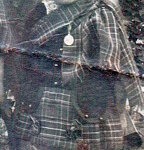

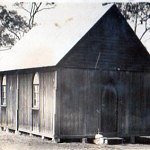
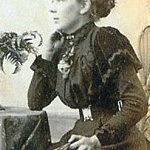
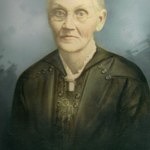
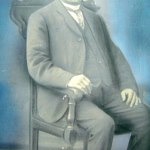

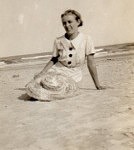

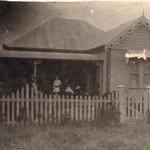
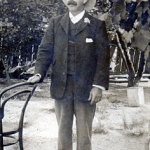
5 Comments
What a wonderfull story , lest have more of the same please
Great to see this go to print Di. Hope you’re well. Simon
A beautiful story, from an area where my relatives live. My Aunty has also just turned 100, and also very well and has wonderful stories of her life on the farm and travels around the world.
Thank you Di for this wonderful coverage of mum’s life. Her extended family, 3 children, 6 grandchildren,9 great grandchildren, and 3 great grandchildren now have a copy to be part of their history. Glenys.
Sorry the last group should be “great great”